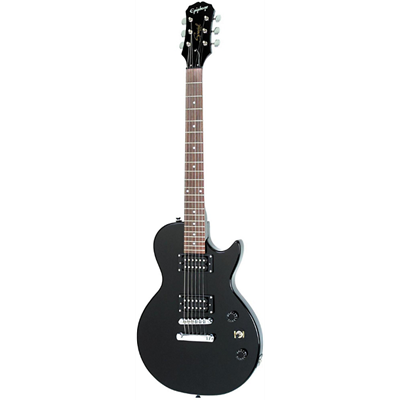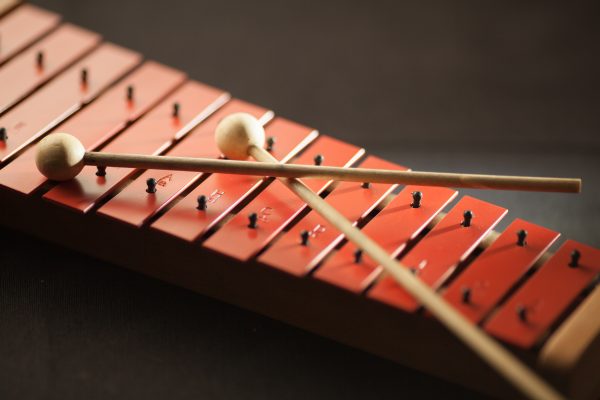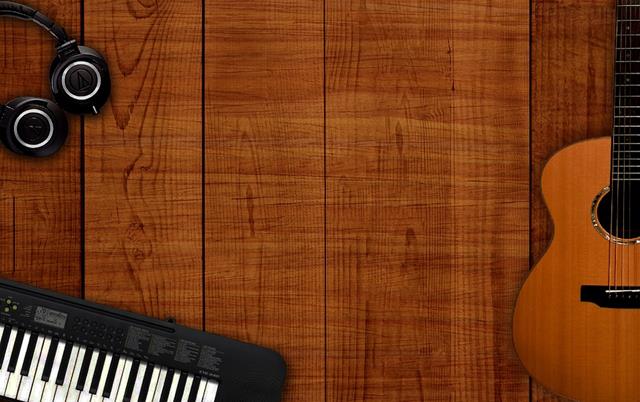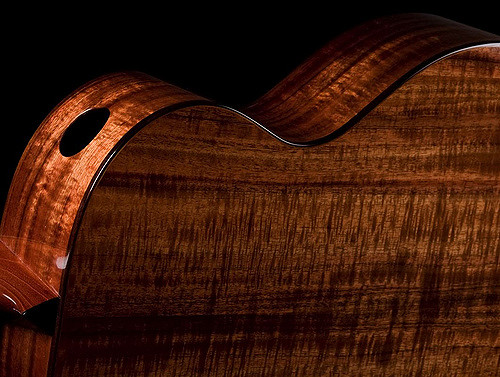MIDI controllers are one of the most important instruments in music production, recording, and live performances.
Although they look like pianos, they can do much more. You can connect it to your favorite DAW and record any instrument or other sound with the help of VST plugins.
These are very versatile instruments that come with different numbers of keys and features and can be used in any genre of music.
What’s The Best MIDI Controller?
The best MIDI controller is the one you feel comfortable with and that has all the features you need. This list contains some of the greatest MIDI controller keyboards you can find on the market today.
| Image | Model | ||
|---|---|---|---|
 | Roland A-88 |  (4.8 / 5) (4.8 / 5) | Check on Amazon |
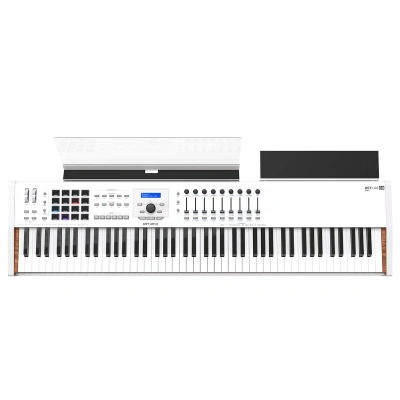 | Arturia KeyLab 88 |  (4.8 / 5) (4.8 / 5) | Check on Amazon |
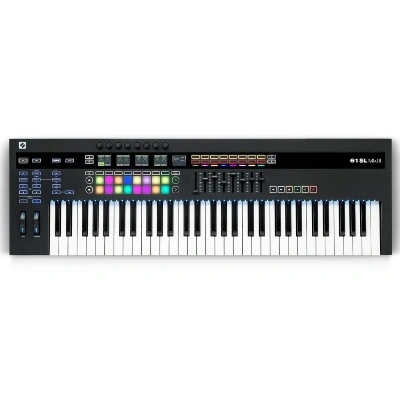 | Novation 61SL MkIII |  (4.8 / 5) (4.8 / 5) | Check on Amazon |
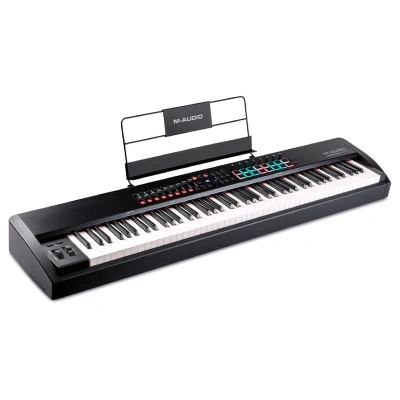 | M-Audio Hammer 88 Pro |  (4.7 / 5) (4.7 / 5) | Check on Amazon |
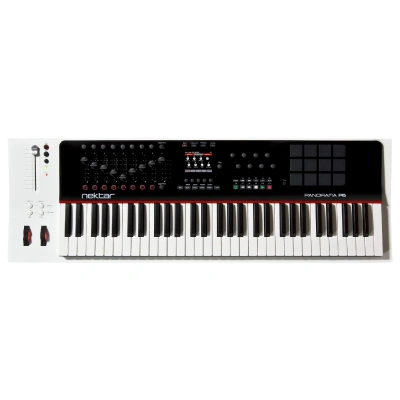 | Nektar Panorama P6 |  (4.7 / 5) (4.7 / 5) | Check on Amazon |
 | Studio Logic SL73 |  (4.6 / 5) (4.6 / 5) | Check on Amazon |
 | Akai MPK261 |  (4.6 / 5) (4.6 / 5) | Check on Amazon |
Roland A-88
| Build Quality: |  |
| Features: |  |
| Controls: |  |
| Sound: |  |
| Value: |  |
| Average: |  |

Roland A-88 is a high-quality MIDI controller that has 88 keys with a realistic feel. At first look, there is nothing special about it, but believe me, it’s an amazing MIDI controller that can do many things. Apart from 88 keys, it offers eight pads that are great for recording drum kits, a pitch/mod wheel, and eight assignable knobs which allow you to easily control various options. But what I like the most is the built-in arpeggiator and option for pedal inputs that extend its capabilities. Roland A-88 is a MIDI controller for professional musicians and recording studios.
Pros:
- Sound quality
- Built-in arpeggiator
Cons:
- Little pricey
Arturia KeyLab 88
| Build Quality: |  |
| Features: |  |
| Controls: |  |
| Sound: |  |
| Value: |  |
| Average: |  |

Arturia KeyLab 88 is one of the best MIDI controllers that offers an exquisite combination of keyboard feel and control options. With its 88 weighted keys with aftertouch, it caters to musicians looking for a premium playing experience. Additionally, it comes with a comprehensive software bundle, including Analog Lab, and features nine rotary encoders, nine faders, and 16 RGB pads for extensive creative control. A perfect MIDI keyboard to use on stage.
Pros:
- Features
- All controls
- Sound
Cons:
- Not for small rooms
Novation 61SL MkIII
| Build Quality: |  |
| Features: |  |
| Controls: |  |
| Sound: |  |
| Value: |  |
| Average: |  |

Novation 61SL MkIII is a versatile MIDI controller with 61 semi-weighted keys and all the features you will ever need to record or play live. It has sixteen pads, eight rotary knobs, a pitch and mod wheel, and all the basics you will find in professional instruments. However, it goes beyond that and offers one of my favorite features such as a sequencer and DAW control that makes recording sessions easier and comfortable.
Pros:
- Great keys
- Features
- Great for recording
Cons:
- Control layout
M-Audio Hammer 88 Pro
| Build Quality: |  |
| Features: |  |
| Controls: |  |
| Sound: |  |
| Value: |  |
| Average: |  |

M-Audio makes one of the best MIDI controllers and I have owned a couple of their products and all of them were great. This particular one, Hammer 88 Pro is no exception – 88 hammer-action keys, sixteen pads, nine faders, eight knobs – these are just some features you get with this MIDI controller. Additionally, it offers inputs for the expression pedal and footswitch. My favorite thing about this instrument is that it comes with a bundle of software such as Pro Tools First, Ableton Live Lite, MPC beats, and additional instrument sounds. Amazing MIDI keyboard for creating and recording music and a great instrument for gigs.
Pros:
- Price
- Great for gigs
- Control options
Cons:
- Not for beginners
Nektar Panorama P6
| Build Quality: |  |
| Features: |  |
| Controls: |  |
| Sound: |  |
| Value: |  |
| Average: |  |

Nektar Panorama P6 is one of the most beautiful MIDI controller keyboards I have ever used. I love the layout of this controller which makes it easy to use. On the left side is the main fader and mod/pitch wheels and on the top you have nine faders, twelve pads, control knobs, and buttons such as play, stop, etc. Also, it comes with a TFT display that is very handy when working with this instrument. Also, it works great with all the major DAWs like Logic Pro, Cubase, Reason, and Reaper. And an amazing thing is that it has a channel strip control that makes working with your favorite digital audio workstation a great experience.
Pros:
- Great control layout
- For recording
Cons:
- Not for beginners
Studio Logic SL73
| Build Quality: |  |
| Features: |  |
| Controls: |  |
| Sound: |  |
| Value: |  |
| Average: |  |

Studio Logic SL73 is a compact yet powerful MIDI controller featuring 73 weighted keys with aftertouch. Its portability and expressive playing capabilities are key highlights, making it ideal for musicians who require a balance between mobility and performance. It doesn’t have pads or controls but its strength is in sounds and instruments – comes with many great sounding presets and programable zones. This MIDI controller is perfect for professional piano players who work in studios or play live gigs.
Pros:
- Sound
- Key quality
Cons:
- Lack of controls
Akai MPK261
| Build Quality: |  |
| Features: |  |
| Controls: |  |
| Sound: |  |
| Value: |  |
| Average: |  |

Akai MPK261 is a versatile and one of the best MIDI controllers that comes with 61 semi-weighted keys, aftertouch, and sixteen MPC-style pads with RGB feedback. It offers extensive DAW integration, an onboard arpeggiator, a step sequencer, a comprehensive software bundle with different instrument sounds, and works with all modern digital audio workstations. This is a perfect MIDI controller for home studios and musicians who record in different styles of music.
Pros:
- Sound
- DAW integration
- Controls and features
Cons:
- Better to have more keys
Conclusion
To find the right or best MIDI controller for you, think about what you need and like. You can choose one that feels like a real piano, has lots of controls, or works well with your music software. Think about how you play, what you want, and how much you can spend. Whatever you pick, it will help you make better music.


